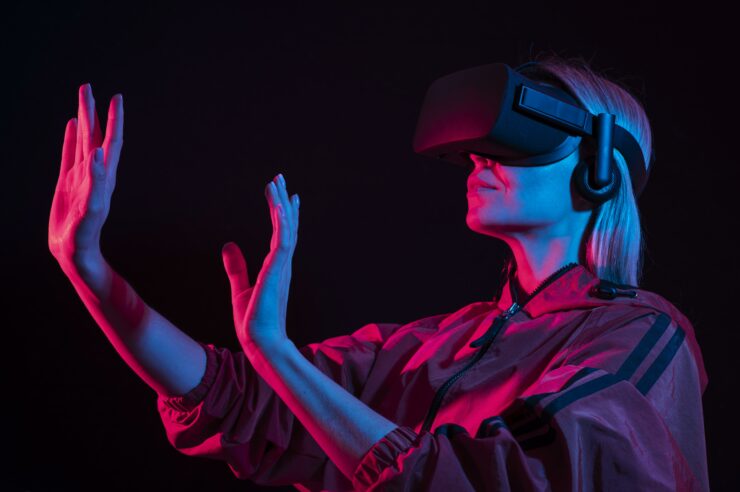Seminar Blogs
“What Do We Mean When We Say ‘Metaverse’?” – Chris van der Vegt

Image by Freepik
Something that came up repeatedly in our discussion on technological imaginaire was the idea of an immersive virtual world or a ‘Metaverse’. ‘Metaverse’ is the name of a product currently in development by Meta, the company previously known as Facebook. At the same time as Meta announced its rebranding at Connect 2021, the company presented its idea for a virtual environment is supposed to become a “successor to the mobile internet” (Meta 2021, 1:51), a space where people can do all the regular things we already do, like work, shop and socialise, as well as new activities that simply don’t exist yet. The idea of a ‘metaverse’ is itself not new. It has existed since the dawn of computers and the term ‘metaverse’ was first used in the sci-fi novel Snow Crash, published in 1992 (Zenou 2022). The repeated mention of metaverses during the TiM seminar has left me wondering: were we talking about Meta’s product or were we using it as a shorthand for any immersive cybernetic environment? And is this ambiguity something we should examine more closely?
What Meta presented at Connect was not a product but a vision for what their product could become and the space it would take up in our lives. At the time, in was still in a stadium may be understood as Patrice Flichy’s ‘watershed utopia’, a phase in the development of a new technology that “allows the full range of possibilities to be explored” (2007, 9). In this conceptual stage, there are no technological limitations, only our wildest imaginings. In this future vision, Meta also latched onto mythologies of existing technologies such as the head-mounted display, which promises immediacy in virtual experiences. Immediacy is described by Jay David Bolter (2000) as the attempt to make the user forget that they are experiencing something through a mediating technology (62). The result in complete immersion in the digital environment.
I’ve personally never bought into Meta’s fantasy. I’ve read enough scifi dystopia that virtual and augmented environments have lost their appeal. A year or so after the fact, I am beginning to think that it doesn’t matter whether people are enthusiastic about or repulsed by the Meta’s future vision. The main effect of Meta’s keynote has been that we now reach for the name of their product when we want to talk about the possibility of any cybernetic world, similar to how SPA has become a stand-in for all bottled water. Meta essentially benefits from the ambiguity between their envisioned product and ‘metaverse’ as a more general term. The company took something that already lived in the public imagination and trademarked it.
I’ve decided that, when talking about immersive cybernetic environments, I’m not going to refer to them as a ‘metaverse’ anymore. It will be my tiny act of resistance against this discursive monopoly that Meta has established for itself. ‘Cyberspace’, ‘virtual reality’ or ‘cybernetic world’ convey the idea just fine and these don’t carry any brand affiliations that have yet to make good on their promises.
References
Bolter, Jay David. 2000. “Remediation and the Desire for Immediacy.” Convergence 6(1): 62-71.
Flichy, Patrice. 2007. The Internet Imaginaire. MIT Press.
Meta. 2021. “The Metaverse and How We’ll Build It Together – Connect 2021.” YouTube. October 28, 2021. https://www.youtube.com/watch?v=Uvufun6xer8&ab_channel=Meta.
Zenou, Theo. 2022. “A novel predicted the metaverse (and hyperinflation) 30 years ago.” The Washington Post. June 30, 2022. Accessed November 3, 2022. https://www.washingtonpost.com/history/2022/06/30/snow-crash-neal-stephenson-metaverse/.

